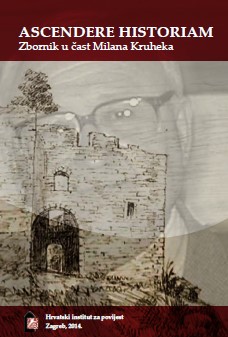Izvješće križevačkoga pukovnika Johanna Josepha Herbersteina o Svidničkoj (Marčanskoj) biskupiji iz 1666. godine
The report of Johann Joseph Herberstein, the commander of the Križevci Regiment, on Bishopric of Svidnica (Marča) from the year 1666
Author(s): Zlatko Kudelić
Subject(s): Christian Theology and Religion, History of Church(es), Military history, 17th Century, Eastern Orthodoxy
Published by: Hrvatski institut za povijest
Keywords: Croatian-Slavonian Military Border; Rome; Vienna court; bishopric of Zagreb; bishopric of Svidnica (Marča); ecclesiastical union; orthodoxy; Vlachs; rebellions; patriarchs of Peć (Ipek);
Summary/Abstract: The main focus of this paper is the analysis of the report of Johann Joseph Herberstein, the commander of the Križevci regiment and vice commander of Varaždin Generalate, on Bishopric of Svidnica (Marča) and the role of Bishop Gabriel Mijakić during the unrest in Krajina in 1666. Besides the reports of several bishops of Zagreb (Benedict Vinković, Peter Petretić and Martin Borković) as well as the reports of the several Jesuit priests on the unrest in Krajina, the Herberstein’s report is one of the most important historical documents for the research of the ecclesiastical union in the areas of Croatian-Slavonian Military Border as well for the research of Greek-Catholic Bishopric of Svidnica (Marča or Platea). According to Herberstein’s report, the main perpetrators of the earlier unrest as well as the unrest in 1666 were bishops of Svidnica and to them loyal priests and monks who had encourage local population by tendentious interpretations of their rights well known as Statuta Valachorum. Even more, Herberstein underlined the phony acceptance of the Church Union and the maintenance of the relations with orthodox patriarchs of Peć in spite of the fact that in order to be nominated the bishops of Svidnica they had to dismiss the subjection to the patriarchs of Peć and to stop the maintaining of any contacts with them. Due to the fact that Herberstein’s information are very similar to those of Peter Petretić, bishop of Zagreb, which can be found in his report from 1662, the author of this paper argues that Herberstein collected his information from Petretić’s report. Nevertheless, Herberstein put some of the responsibility for the unrest in Krajina in 1666 even on the Vienna court, because it has nominated the bishops of Svidnica from those candidates proposed by the local inhabitants, priests and monks, in spite of the fact that they could not reach the criteria of the Catholic Church as well as in spite that those candidates were bogus Greek-Catholics. Therefore, as the solution for the problems, Herberstein proposed replacing of the Bishop Gabriel Mijakić as well as the expulsion of those monks and priest who had just phony accepted the ecclesiastical union, and appointing of the new Greek-Catholic bishop of Svidnica more suitable to Catholic Church. Even more, the author argues that the Vienna court has not immediately reacted to the Herberstein’s report, but it was, together with other negative reports on Bishop Mijakić from 1667 and 1668, one of the arguments in replacing Bishop Gabriel Mijakić, although the official statement was that the bishop was replaced because of his role in the conspiracy of the Zrinski and counts Frankapani (1671). The reason for this different official statement was the fear of the Vienna court that the real reasons of the replacement of Bishop Mijakić – not accepting of the ecclesiastical union and maintaining the contacts with the patriarchs of Peć – would provoke new unrests of the Vlachs in Krajina. Therefore, the Vienna court had continuously underlined that Bishop Mijakić was punished by long sentence punishment because of his part in conspiracy of the Zrinski and Frankapani, for what there was no evidence at all. Nevertheless, the Vlachs had not forgotten him during his long lasting imprisonment and hoped that he would be freed and appointed once again for the bishop of Svidnica. This did not happen because Bishop Mijakić died in prison in 1686.
Book: Ascendere historiam: Zbornik u čast Milana Kruheka
- Page Range: 229-247
- Page Count: 19
- Publication Year: 2014
- Language: Croatian
- Content File-PDF

